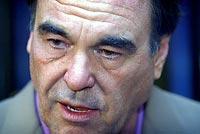Humanity, heart and harmony with ... um ... Oliver Stone?!

Just a second. This is Oliver Stone.
"JFK." "Born on the Fourth of July." Big gay (and subsequently gayed-down) flop "Alexander." Now the controversial and outspoken left-leaning director has made a movie called "World Trade Center" about the most shocking, conspiracy-theorized event of our time.
And the result is ... utterly devoid of cynicism? About two brave cops trapped in rubble, and their loving families? Unabashedly celebrating American brotherhood?
Just a second. This is the guy who made "Wall Street." I got Stone on the line from Los Angeles to find out what gives.
Q: This doesn't seem like an Oliver Stone Movie. The tone is earnest and sentimental, with no politics or conspiracies or shady people.
A: Yeah. Well, that's because it was limited to those five people — the four members of the family and the Marine rescuer. So, I mean, inside those formats of those personalities, as you say, there were no "shady people."
Q: But why?
A: In the fictional sense, it's a common enough occurrence: a rescue and a mission of rescue. But here, when you get into the facts of it, it's amazing. I mean, these two guys at the epicenter of the damn thing survive, and then they're able to digest and tell their stories. ... And they both have good marriages. And then you have this insane — not insane, improbable — rescue by a Marine who's a born-again Christian and an accountant, and it's all true. It's pretty outrageous, you know? As a filmmaker, why tell more?
Q: The irony is that we're now hearing more conspiracy theories ...
A: I originated that stuff. [Laughs]
Q: ... that the collapse of the Towers looked like controlled demolitions.
A: Yeah, sure. That's nothing to do with the story, you know? Nothing to do with what [these characters] heard or saw. They didn't even know what happened. They didn't know the towers came down. They thought it was a truck bomb and the concourse fell in or something.
Q: Conservatives who were your mortal enemies — Fox News, The National Review — are your new biggest fans.
A: Well ... you know ... [Laughs] I always have considered myself a dramatist, which means I deal with people and people's reactions to people. So my first concern always has been as a human being. That's what I thought most of my movies were about. I never went about a movie saying, "I gotta do a movie about global warming." I can't do it that way. I always did it from the people who led me to the issue. So I'm glad that they like it. And if I'm talking to the part of them that can recognize the humanity of these men, that's wonderful. Because that's the only thing that's going to bring together all the sides that are fighting all over the world, is a common heart, a feeling that we are in this together.
Does that sound like Oliver Stone? But it's like the way I feel, you know? It's not the one that you guys want — I mean, not you guys, because you're all different. But there's an Oliver Stone out there that I don't recognize, you know? It's an asteroid of the Internet universe, you know? It's called Oliver Stone, but what the [expletive] is it about me?
Q: If there is a different tone, how much of it has to do with your turning 60?
A: [Deep breath.] You know, there's moments of affection between the husbands and the wives, and I think those are moments that are not always in my films. ... Where most of the people I've dealt with, their marriages were not working. They're falling apart. So you could say that finding harmony is very important to me as an older man.
Q: What do you say to people who accuse filmmakers of cashing in on the tragedy?
A: I don't know what to say, you know. The story had to be told. And if it's told well in a film, I don't see the clash. It's something that should be remembered. It can be memorialized. Architects work for money. So do statue builders. We're not trying to cash in. We almost took no money. We're riding the back end. ...
Q: People made Vietnam movies while that war was still going on. How do you answer the question of what's too soon?
A: It just happened when it happened. It took [the men who went through Sept. 11] two years to digest it and to talk about it, recover from their wounds. It took ... a year to put the story in some form, and it lay dormant for another, like a bottle of wine that needed to wait, and then the fourth year is when I got involved, and the fifth year it came out. So it had its own time period, as did [Paul] Greengrass' film ["United 93"]. ... There are seven good movies, at least, about Vietnam. There's no reason why there can't be five, seven good movies about this subject matter, all told in different stories, different forms.
Q: You re-created the ruins on a huge set. How did it feel working in that?
A: It was a nightmare, claustrophobic. It was like being in a coal mine. It was a miserable experience. You try walking on rubble. It's worse than an aerobics class, actually, for an hour. Working in confined spaces — lighting became important, moving less so. And the rubble field was very tough to shoot, too.
But we had the real guys. We had a lot of the real guys helping us.
Mark Rahner: 206-464-8259 or mrahner@seattletimes.com
